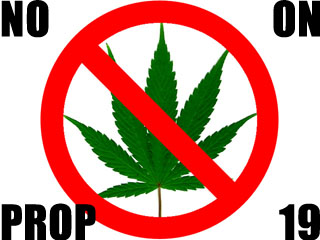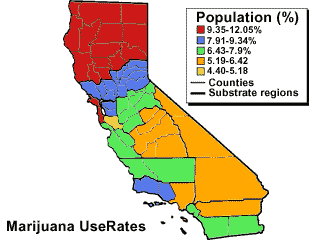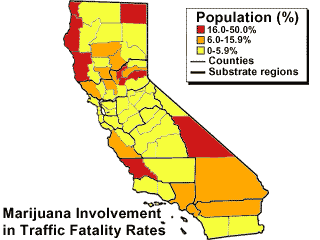Arguments Against Proposition 19: Why the Marijuana Initiative is Bad for California

Introduction
Marijuana (cannabis) is the most widely used illegal drug in many developed countries.1 California's Proposition 19, the Regulate, Control and Tax Cannabis Act 2010 (RCTCA) to be voted on this fall by the citizens of California, will decide whether marijuana will become legalized for cultivation, transportation and personal use by adults 21 years of age and older. If passed, this will be the first legalization of marijuana use for non-medical reasons in the United States.
What Prop 19 would do
Proposition 19 legalizes the personal cultivation (up to 25 square feet) and use and transportation of marijuana (up to one ounce).2 Of course, 25 square feet of marijuana plants produces much more than one ounce of marijuana. Although the initiative provides penalties for adults (over 18 years old) providing marijuana to minors, there is nothing in the law that prohibits minors from growing and providing marijuana to each other. Presumably their parents could be held liable, although it would have to be proven that they provided the marijuana initially.
Protected class of users
Proposition 19 establishes a dangerous legal precedent by establishing marijuana use as a protected class under the law:
No person shall be punished, fined, discriminated against, or be denied any right or privilege for lawfully engaging in any conduct permitted by this Act or authorized pursuant to Section 11301 of this Act. Provided however, that the existing right of an employer to address consumption that actually impairs job performance by an employee shall not be affected.2
Employers will be unable to prevent marijuana use by their employees unless they can prove that such use impairs job performance. Exactly how they would prove that marijuana use impairs job performance would be difficult, at best. It should be noted that alcohol abuse is not a protected class, whereas proposition 19 would create such a protected class for marijuana users.
Loss of federal grants
Proposition 19 creates a state law that conflicts with federal drug laws. On the surface, this does not seem to be a big deal, since President Obama has stated that he won't enforce the federal law in California. However, there is another issue that could cause the loss of billions of dollars to the state. Public contracts and grants require grantees to effectively enforce the drug-free workplace requirements (which includes marijuana use) outlined by the federal government's Federal Workplace Act of 1988. Not only may schools lose their federal grants, but medical research institutions, including the one for which I work (Cedars-Sinai Medical Center), could lose millions of dollars annually.
Rights of property owners?
The language of the initiative is unclear about the rights of property owners who rent to others. Section 11300 (a) provides that "cultivation on leased or rented property may be subject to approval from the owner of the property" (emphasis added).2 Since this provision does not state "shall be subject to approval," it is unclear if property owner approval is required. Property owners will be at the mercy of the courts' interpretation of this section, in light of the establishment of marijuana use as a protected class, if they attempt to block marijuana cultivation on their own property.
"Regulate and control and tax"?
The title of Proposition 19, "the Regulate, Control and Tax Cannabis Act 2010" implies that marijuana is going to be regulated and controlled by the initiative. In fact, the law provides for no regulation or control, but leaves it up to local governments to initiate such controls and or regulations. In addition, there are no provisions to tax marijuana cultivation or use in the initiative. Instead, such taxation, if it ever happens will be left to local governments. In fact, a provision of the initiative specifically prevents the stat of California from taxing marijuana sales any more than the usual sales tax,3 in contrast to cigarettes and liquor. Since the enforcement of locally enacted taxation will be next to impossible, there will never be any significant revenue produced through this initiative.
Major supporters will profit
Much of the financial support for Proposition 19 comes from Richard Lee, who runs "Oaksterdam University," which teaches "students" the "fine arts" of cannabis growing, and S.K. Seymour LLC, a Medical Cannabis Provider, who would profit immensely through the estimated 90% drop in costs of marijuana, as supplies increase dramatically. There has been virtually no grassroots financial support for Prop 19.4
Adverse health effects
As a recreational drug, marijuana is not quite as benign as most of its proponents would claim. Heavy marijuana use results in long-term effects on the brain, including lower responses in those areas which are affected by THC. Although users are able to compensate somewhat through the use of other brain areas, the long term effects of this damage, as users age, has not been determined. This damage may be responsible for impairments noted in short-term and long-term memory, along with a host of possible other psychiatric illnesses. A proportion of marijuana users become addicted and suffer from classic withdrawal symptoms upon abstinence. For a minority of users, marijuana is a gateway drug, and they proceed to use and abuse more powerful psychostimulants. Besides its effects upon the brain, marijuana use can lead to increased risks for respiratory cancers and may have some adverse cardiovascular and cerebrovascular effects in some users. Marijuana smoke has been placed on the California Proposition 65 list of carcinogenic materials, as required by California law for materials proven to cause cancer.5 Marijuana use during pregnancy has been shown to result in lower child intelligence, while increasing the incidence of mental health problems. The idea that marijuana is a harmless recreational pastime has been disproved through continuing scientific research. More information and documentation of the adverse health effects of marijuana use is available in a review of the current scientific literature.
Social costs
Although marijuana use does not universally negatively impact all individual's health, it will result in increased health care and mental health costs resulting from increased marijuana use and abuse among Californians.6 How do we know marijuana use will increase if Prop 19 is passed? The map to the right shows the percentage of the population that use marijuana throughout the state of California. Marijuana use is nearly double in the northern counties of the state, where marijuana cultivation is much higher than in other counties. The American Academy of Pediatrics opposes the legalization of marijuana, because of increased likely abuse by adolescents.7
Buzzed Driving
As a result of increase availability of marijuana should Proposition 19 pass, the number of people driving under the influence of marijuana will also increase dramatically, as it has in Europe, since its legalization there. In addition, there is no THC blood standard for what constitutes "driving under the influence" of marijuana, so police will fine it difficult to enforce marijuana DUI arrests. The cost in terms of increased deaths from automobile accidents could be in the hundreds to thousands of lives lost. A recent study projects that fatalities due to buzzed driving will increase by 300%.8 What are they thinking?
Conclusion

Proposition 19, the Regulate, Control and Tax Cannabis Act 2010, is bad news for Californians. The initiative is poorly written and establishes a legal "right" to use marijuana, potentially endangering the lives of others through allowing intoxicated individuals to perform crucial driving jobs unless "consumption that actually impairs job performance" (e.g., they are involved in an accident). In addition, Prop 19 could result in the loss of billions of dollars in federal grants and contracts to schools and hospitals, which would be unable to comply with federal drug-free workplace requirements. Contrary to the claims of proponents, Prop 19 would neither regulate, control, nor tax marijuana, but merely provides the legal right of local governments to create their own hodgepodge of local laws and ordinances, which would be virtually impossible to enforce. Although marijuana use does not negatively impact all users, it does have numerous adverse health effects on a significant percentage of individuals, which will result in increased medical and social costs to the people of California. We don't need all the problems that will result from the passage of Proposition 19. Vote No on Prop 19.
Related Pages 
- No On Proposition 19 - the official opponents of Prop 19.
- MarijuanaHarmsFamilies.com - Don't let California go to pot.
- The Medical 'Benefits' of Smoking Marijuana (Cannabis): a Review of the Current Scientific Literature
- Is It Okay for Christians to Use Marijuana and Other Drugs?
- Cannabis: an apology, The Independent, Sunday, 18 March 2007.
References 
- Hall W., L. Johnston, and N. Donnelly. 1998. The epidemiology of cannabis use and its consequences. In: Kalant H, Corrigal W, Hall W, Smart R, eds. The Health Effects of Cannabis. Toronto: Addiction Research Foundation.
- Proposition_19_text.
- Analysis of The Regulate, Control and Tax Cannabis Act of 2010 by Attorney John Lovell.
- Marijuana legalization receiving fewer contributions than previous drug-related propositions, Los Angeles Time, August 8, 2010.
- EVIDENCE ON THE CARCINOGENICITY OF Marijuana Smoke, California Environmental Protection Agency.
- Fact 6: Legalization of Drugs will Lead to Increased Use and Increased Levels of Addiction. U.S. Drug Enforcement Administration.
- POLICY STATEMENT: Legalization of Marijuana: Potential Impact on Youth, The American Academy of Pediatrics.
- Alfred Crancer and Alan Crancer. 2010. The Involvement of Marijuana in California Fatal Motor Vehicle Crashes 1998 -2008.
http://www.godandscience.org/doctrine/no_on_proposition_19_marijuana.html
Last Modified October 29, 2010






